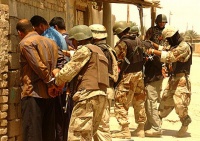Home » Reports » IRQ - News » Iraq: Yemeni Citizen Arrested by US Forces in 2009 Disappears in Iraqi Prison
On 12 August 2009, 17-year-old Al Baydani was arrested by U.S. forces in Tal Afar a district in north western Iraq viewed as a success story of the U.S. counterinsurgency operations in the country – in Georges W. Bush's own words, "once a key base of operations for al Qaeda and now a free city that gives us reason to hope for a free Iraq." The soldiers immediately confiscated his identity card and did not show him any official document justifying his arrest, in violation of the Status of Forces Agreement (SOFA), Article 22(1), which states that "No detention or arrest may be carried out by the United States Forces [...] except through an Iraqi decision issued in accordance with Iraqi law." Since the beginning of the U.S. occupation in Iraq in 2003, the U.S forces carried out a mass arrest campaign targeting all Arabs of non-Iraqi origin, collectively suspected of belonging to the "armed resistance" against the U.S. Occupation Forces. The arrest campaign did not spare teenagers such as Al Baydani.
Following his arrest, Saleh was detained for 10 months in the Central Prison of Baghdad, previously known as Abu Ghraib and sadly notorious for its systematic practice of torture (including physical, psychological and sexual abuse). For the first nine months of his detention, Saleh was held incommunicado, as he was neither allowed to contact his family nor to communicate with the outside world. He was finally authorised to talk to his family in May 2010, the first time since his arrest.
Al Baydani was then transferred for one month to a detention facility in the Green Zone controlled by the Baghdad brigade. Officially known as the Iraqi Army's 56th Brigade, the Baghdad brigade is under the direct authority of the Prime Minister and is infamous for having run secret detention facilities, as well as for torturing and ill-treating detainees. He was then brought back to Baghdad's Central Prison – a current practice for prisoners held by the Baghdad brigade – before being transferred again to the then secret prison of Al Rusafah, where prisoners are "subjected to routine and systematic torture" before being moved to Al Soussa prison in Baghdad.
On 18 July 2011, Al Baydani was brought before the Al Saa Court, where, following a heavily flawed trial, he was sentenced to death on the sole basis of "evidence" obtained under torture for association with a terrorist group under the anti-terrorism law. Such an unfair verdict is contrary to Iraqi and international law, as both bodies of law uphold guarantees to fair trial and prohibit the imposition of the death penalty on juveniles. For this reason, and concerned over his imminent risk of execution, on 23 August 2012 Alkarama sent a urgent appeal to the Special Rapporteur on Extra-judicial, Summary or Arbitrary Executions (SR SUMX).
On 10 December 2012, after being informed of Al Baydani's transfer to another prison in Baghdad, Al Kadhamyia, known as the place where death sentences are carried out, Alkarama submitted a second urgent appeal to the Special Rapporteur on Extra-Judicial, Summary or Arbitrary Executions (SR SUMX) demanding that his execution be halted and his case retried by a court of law in compliance with international standards of fair trial. According to his family, Al Baydani's execution was subsequently suspended.
Detained in Al Kadhamiya prison, Al Baydani was allowed to call his family on a regular basis until the end of June 2014. With no apparent reason, however, his relatives stopped receiving calls from him. Their various attempts to obtain information from the prison authorities were unsuccessful.
Facing no other options Al Baydani's family contacted the International Committee of the Red Cross (ICRC) – whose mandate includes ascertaining the fate of missing persons when steps at the governmental level have failed – who informed Al Baydani's family in January 2015 that he would have been transferred to an unknown detention centre situated in the Basra Governorate in southern Iraq, close to the border with Kuwait. No reason was given by the authorities, and Al Baydani's family has not received any other information since.
As a last resort, Alkarama sent a communication to the UN Committee on Enforced Disappearances (CED) asking them to intervene with the Iraqi authorities to demand Al Baydani's immediate release or, at the very least, that he be put under the protection of the law and that his pending death penalty be halted. His family should be made aware of his whereabouts and allowed to visit him as soon as possible. As a party to the International Convention for the Protection of all Persons from Enforced Disappearances (ICPPED) since November 2011, Iraq must put an end to the practice of enforced disappearances, which violates the most fundamental human rights, and hold those responsible for such violations to account.
For more information or an interview, please contact the media team at This email address is being protected from spambots. You need JavaScript enabled to view it. (Dir: +41 22 734 1007 Ext: 810)
 Algeria
Algeria Bahrain
Bahrain Djibouti
Djibouti Egypt
Egypt Iraq
Iraq Palestine/Israel
Palestine/Israel Jordan
Jordan Kuwait
Kuwait Lebanon
Lebanon Libya
Libya Mauritania
Mauritania Morocco
Morocco Oman
Oman Qatar
Qatar Saudi Arabia
Saudi Arabia Sudan
Sudan Syria
Syria Tunisia
Tunisia United Arab Emirates
United Arab Emirates Yemen
Yemen Other Countries
Other Countries







